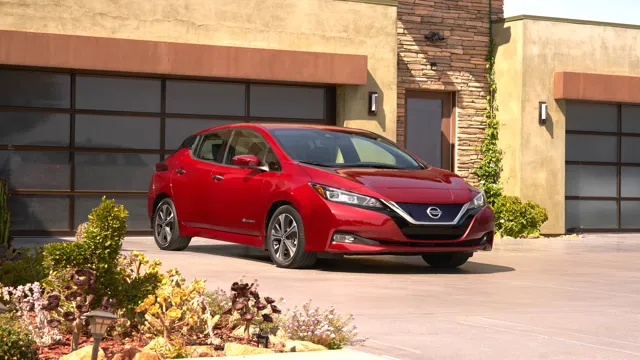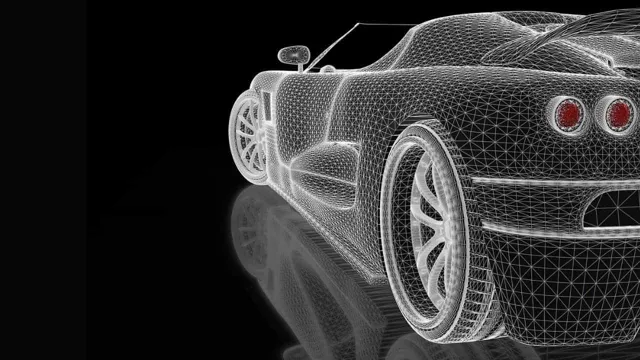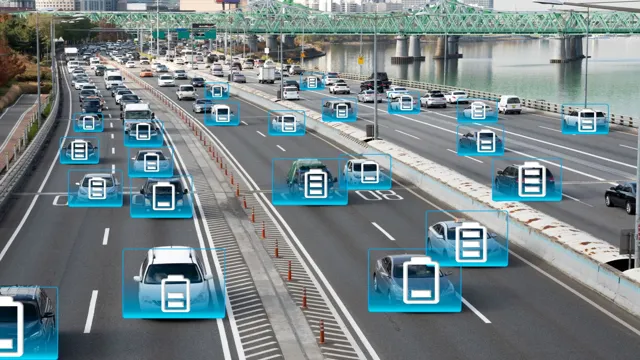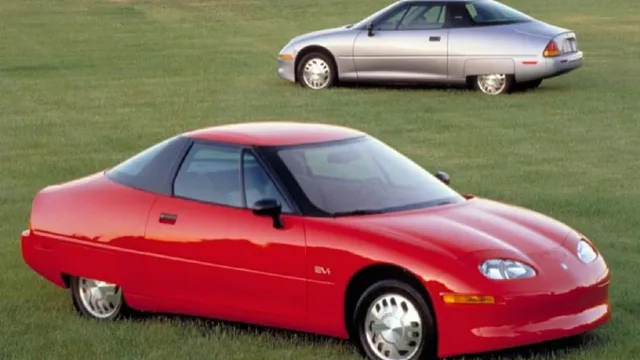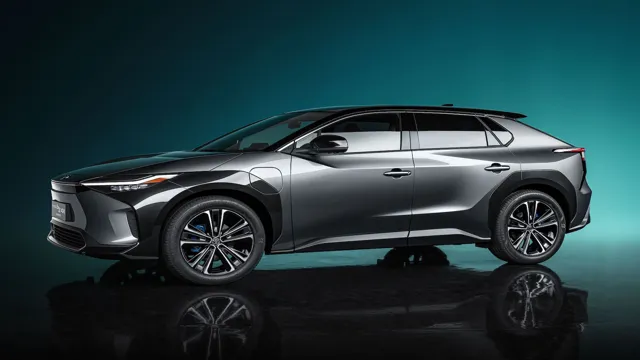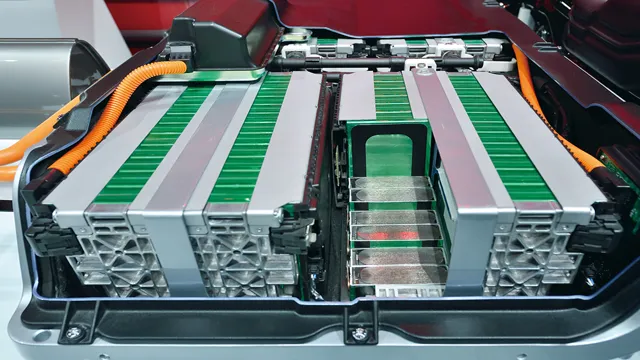Revolutionizing the Road: The Advanced Technology behind the Nissan Leaf Electric Car
Have you ever considered owning an electric car but worried about its reliability and lack of power? Worry no more, because the Nissan Leaf is here to revolutionize the industry and change your perception of electric cars. The Nissan Leaf is a game-changer, breaking boundaries and leading the way for a sustainable future. It’s sleek and refined design coupled with its advanced technology ensures a smooth and efficient ride.
With zero emissions, the Leaf is also eco-friendly and incredibly cost-effective, giving drivers the chance to save money whilst reducing their carbon footprint. If you’re wondering whether the Nissan Leaf will offer you enough charging capacity to sustain your daily needs, don’t fret. With a range of up to 226 miles, this electric car will be more than sufficient for your daily commutes, errands, and road trips.
The Leaf also offers rapid charging capabilities, allowing you to charge up to 80% within 40 minutes. So, why not ditch your traditional gas-guzzling car and switch to an electric one that’s not only better for the environment but also more reliable and advanced? Join the electric revolution and make the Nissan Leaf your next ride.
History of the Nissan Leaf’s Technology
The Nissan Leaf electric car is a technological wonder that has made waves in the automotive industry since its debut. The Leaf’s all-electric powertrain and fast-charging capabilities make it a true contender in the EV market. Nissan’s engineers have been continuously refining the Leaf’s technology since its release in 2010, with major improvements in battery capacity and range.
With each generation, the Leaf’s technology has improved, resulting in a longer driving range, improved acceleration, and advanced features such as ProPILOT Assist, which helps drivers stay centered in their lane. Nissan has also introduced a range of accessories and charging options to make the Leaf a more convenient and efficient vehicle. From its early beginnings to its current incarnation, the Nissan Leaf is a testament to the power of advanced automotive technology and its potential to shape the way we drive and live.
Development of the Zero Emissions Vehicle (ZEV)
The Zero Emissions Vehicle (ZEV) concept dates back to the 1990s when the California Air Resources Board proposed a mandate for automakers to sell a certain percentage of electric vehicles to reduce air pollution in the state. The Nissan Leaf, launched in 2010, was among the first mass-produced electric vehicles, marking a new era in the development of ZEV technology. The Leaf’s battery-powered drivetrain, regenerative braking system, and lightweight body design are some of the key features that make it an efficient and eco-friendly ride.
The Leaf has since undergone several updates, including increased battery capacity and improved range, making it a popular choice among green-conscious drivers. The Leaf’s technology has paved the way for other electric vehicles, and Nissan continues to innovate with new ZEV concepts and technology, with the goal of creating a more sustainable and cleaner transportation system for future generations.
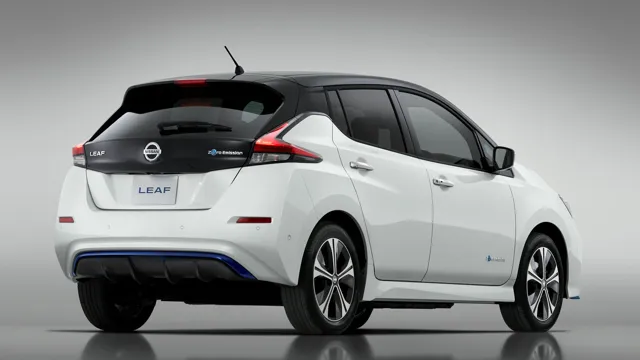
Introduction of the Nissan Leaf
The Nissan Leaf is an electric car that has been making waves in the automotive industry since its introduction in 20 The Leaf has been a trailblazer in the world of zero-emissions vehicles, and it has revolutionized the way people view electric cars. One of the most significant aspects of the Leaf is its technology, which has evolved significantly over the years.
The history of the Nissan Leaf’s technology dates back to its initial launch, where it featured a 24kWh battery pack. This battery pack provided a driving range of approximately 73 miles per full charge. However, over the years, Nissan has made significant improvements to the technology, increasing its battery size and range.
The second-generation Leaf, launched in 2018, features a 40kWh battery pack that provides an estimated driving range of 150 miles. Additionally, Nissan has introduced a 62kWh battery pack that provides a range of up to 239 miles, making it one of the best electric vehicles on the market today. The Nissan Leaf’s technology has come a long way over the years, and it continues to evolve, contributing to electric car innovation in the industry.
Advancements in Electric Car Technology in the Nissan Leaf
Nissan has been making advancements in electric car technology, specifically in the Nissan Leaf. One of the latest innovations is the e-Pedal, which allows drivers to accelerate and brake with just one pedal. This technology not only simplifies the driving experience but also improves energy efficiency and reduces wear and tear on the brakes.
Another exciting development is the ProPILOT system, which enables the car to drive itself in specific situations, such as in heavy traffic. This system uses a camera and radar to monitor the surroundings and maintain a safe distance from other vehicles. Moreover, the Leaf has a range of up to 226 miles on a single charge, making it a practical option for daily commutes and long trips.
With these additions, the Nissan Leaf is not only environmentally friendly but also user-friendly and efficient, giving drivers a futuristic driving experience.
Battery Technology
Electric Car Technology, Nissan Leaf, Battery Advancements In recent years, electric car technology has made great strides in producing vehicles that are more powerful and efficient than ever before. A prime example of this is the Nissan Leaf, which has become increasingly popular thanks to its advancements in battery technology. The latest model of the Leaf boasts a larger battery size, which means it has an extended driving range of up to 150 miles on a single charge.
This is more than enough for most drivers to go about their daily business without worrying about running out of juice. The batteries in the new Leaf are also more durable and efficient than previous models, meaning you can expect the car to last longer and require less maintenance overall. All in all, the advancements in electric car technology have greatly benefited the Nissan Leaf, making it a truly viable alternative to traditional gasoline-powered vehicles.
Charging Capabilities and Efficiency
The Nissan Leaf is a prime example of the advancements made in electric car technology, particularly when it comes to charging capabilities and efficiency. One of the standout features of the Leaf is its quick charging ability, which allows for an 80% charge in just 40 minutes when using a DC fast charger. This means less time spent waiting around at charging stations and more time on the road.
Additionally, the Leaf’s regenerative braking system helps to improve efficiency by capturing energy that is usually lost during braking and using it to recharge the battery. This makes it possible to stretch the car’s range even further, which is crucial for drivers who want to take longer trips without worrying about running out of power. Overall, the Nissan Leaf is a testament to the progress that has been made in electric car technology and the exciting possibilities that lie ahead.
Range and Performance
The advancements in the Nissan Leaf’s electric car technology have been game-changing in terms of range and performance. Nissan has made significant improvements, increasing the battery capacity and even installing a new heat-pump system, allowing the car to perform in cold weather conditions while maintaining its range. The new e-Pedal system is another addition that is revolutionizing the driving experience.
Drivers can now use the accelerator pedal for both acceleration and braking, making driving less of a hassle than ever before. These advancements have resulted in the Leaf becoming a popular choice for eco-conscious drivers who demand high performance and reliability from their cars. The Leaf’s extended battery life and improved performance have made it a contender to replace traditional internal combustion engine cars.
Overall, the advancements made by Nissan in electric car technology for the Leaf have paid dividends in enhancing the range and performance of today’s electric cars.
Impact of the Nissan Leaf’s Technology
The Nissan Leaf electric car has truly revolutionized the world of electric vehicles through its advanced technology. This remarkable vehicle harnesses an electric powertrain, which allows it to achieve an efficient and eco-friendly performance. The Leaf’s lithium-ion battery holds a massive charge and gets an impressive range, making it perfect for eco-conscious daily drivers and urban commuters.
The car’s regenerative braking system is yet another notable feature that has contributed to its success. Whenever the driver applies the brakes, the system captures the kinetic energy and uses it to recharge the battery. This is a smart way of supplementing the energy available to the car while also improving overall efficiency and reducing emissions.
With the Nissan Leaf electric car technology, driving has never been more effortless, sustainable, or fun!
Reducing Carbon Footprints and Air Pollution
The Nissan Leaf’s electric technology has made significant strides towards reducing carbon footprints and air pollution. Switching to electric vehicles like the Nissan Leaf reduces our overall carbon footprint as there are no emissions produced when driving, unlike traditional vehicles that burn fossil fuels. Additionally, by eliminating exhaust fumes from the internal combustion engine, the Leaf plays a pivotal role in reducing air pollution levels.
The Leaf is also equipped with regenerative braking systems that help recharge the vehicle’s battery as the driver brakes, reducing wastage of energy. It’s a bit like how taking stairs instead of an elevator is better for your health, and walking instead of driving is better for the environment. By driving a vehicle like the Nissan Leaf, we take a significant step towards cleaner air and a sustainable future.
Affordability and Dependability
The Nissan Leaf has made a significant impact in the automotive world due to its affordability and dependability. This electric car features cutting-edge technology that has revolutionized the market. The car’s electric motor produces no emissions and can travel up to 150 miles on a single charge.
The Leaf also features regenerative braking, which captures energy from the brakes and converts it into electricity to power the car’s battery. This innovative technology has made the Nissan Leaf an excellent choice for eco-conscious drivers who want a reliable and cost-effective mode of transportation. With its sleek design, impressive range, and affordable price tag, the Leaf is quickly becoming one of the most popular electric cars on the market.
Plus, with the bonus of having reduced maintenance costs and fuel costs in comparison to traditional gasoline vehicles, it’s a practical choice as well. So, whether you’re on the hunt for an eco-friendly vehicle or just want to save on fuel, the Nissan Leaf’s technology makes it a fantastic option to consider.
The Future of Electric Car Technology in the Nissan Leaf
When it comes to electric car technology, the Nissan Leaf is at the forefront of innovation. The future looks bright for this eco-friendly vehicle, with advancements in battery technology and charging infrastructure on the horizon. Nissan has already made significant improvements to the Leaf’s driving range, increasing it to over 150 miles on a single charge.
But the company isn’t stopping there. They are currently developing a new battery system that will allow the Leaf to travel even further without needing to stop for a charge. In addition, Nissan is working on expanding the availability of fast-charging stations, making it easier for Leaf owners to take longer trips without worrying about running out of battery.
Ultimately, the future of electric car technology in the Nissan Leaf looks promising and exciting, and will undoubtedly continue to evolve and improve as technology advances.
Conclusion
In summary, the Nissan Leaf represents a true revolution in electric vehicle technology. With its advanced battery system, instant torque, and sleek design, it’s clear that Nissan is committed to leading the charge towards a more sustainable future. And, of course, the fact that the Leaf is simply a pleasure to drive doesn’t hurt either.
So, whether you’re a die-hard environmentalist or simply someone looking for a smarter, more efficient way to get around, the Nissan Leaf is sure to impress.”
FAQs
What is the driving range of the Nissan Leaf electric car?
The driving range of the Nissan Leaf electric car varies by model year and battery capacity. The 2021 Leaf has an estimated range of up to 149 miles per charge, while the Leaf Plus model has an estimated range of up to 226 miles per charge.
How long does it take to charge a Nissan Leaf electric car?
The charging time for a Nissan Leaf electric car depends on the type of charger and battery capacity. Using a standard level 1 charger, it can take up to 24 hours to fully charge a Leaf. With a level 2 charger, it can take around 8 hours. Alternatively, using a DC fast charger, the Leaf can charge from 0% to 80% in around 30 minutes.
What other technologies are included in the Nissan Leaf besides electric power?
The Nissan Leaf electric car features technologies like regenerative braking, a rearview camera, and smartphone integration via Apple CarPlay and Android Auto. Higher trims may also include features like a 360-degree camera system and active cruise control.
Is the Nissan Leaf a good choice for a daily commuter car?
Yes, the Nissan Leaf electric car can make a great daily commuter car due to its quiet and smooth ride, low cost of ownership, and eco-friendly nature. As long as you have access to charging infrastructure and its range meets your daily driving needs, the Leaf can be a hassle-free and enjoyable way to commute.
